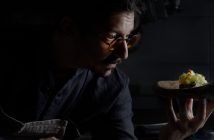I was back in Prague for the first time since living in Germany six years ago. I was recommended to try out the hot, new opening: Field.
Field opened in late 2014, and has already got a Michelin star; making it one of only three Michelin-starred restaurants in the city. Inside it’s light and airy, designed simply with dark wooden floors, and white walls. Look up though, and you’ll see heavy, farming machinery suspended from the ceiling, precipitously dangling above your head.
The maitre d’ smiles as he guides us to the table, as if to say, I know you’ll enjoy this. I did. A lot.
Suffice to say – before I continue my ramblings – that this is a top-notch restaurant, and it is all the better for being in Prague. The service is excellent. The setting is simple but mischievous. The wine list is a fascinating and varied mix, of excellent, unusual Central European, and robust French wines.
The food is magical. There’s a touch of the Heston about it, with smoking potions, and outlandish flavours emerging unexpectedly from innocent-looking butters and sauces. The breadbasket, whose pretzel balls are delicious, plump and dense, comes with a chicken skin butter – which might in its preparation sound rather off-putting but is Dionysian in its dark, delicious lightness.

That dark lightness – which I admit might sound a rather abstract turn of phrase – runs throughout the dishes. It’s created by combining those classic, deep, almost sinister Bohemian flavours of inky dark beers, goose livers, potato dumplings, and roast haunches of veal with the elegant creativity of a New Scandinavian fine dining. The result is a quintessentially Czech umami of dusky sweetness and gossamer-like moreishness.
What makes these flavours even more enjoyable is the restaurant’s playfulness. The amuse bouche is a moss-covered block of varnished wood. Morsels of chicken mousse and mustard sponge dance with notes of wild mushrooms and Jerusalem artichokes, found in amongst leaves and twigs. Polished veal bones act as barrows for a bed of crunchy, black, earth-like granules of intense reduced veal stock, out of which grow beef-stock truffles on sticks. A woodland of delights; invoking the dark, enchanting, impishness of the Bohemian Forest; luring you deeper into the unknown.
The tasting menu’s seven courses chart a path through the forest like vignettes of a Czech folk tale. Each dish is a different scene or location. The cheese course is served in a picnic hamper with bottles of beer like a young, courting couple on a light Sunday in summer. The rabbit brains with turnip bean and mustard paints the gustatory picture of boys playing at hunting in the long grass of a grey-green, windswept, never-ending meadow. While the frog legs in a soup of egg yolk and horseradish is like stumbling upon a pond in a clearing of the woods, as an amber, setting sun trickles through the high branches of the trees.

The restaurant’s tagline is “free-range dining”: a pun on the dishes’ woodland imagery, and the farm-to-table freshness of the produce. But this tagline, perhaps unwittingly, creates a hitherto non-existent dichotomy between “urban, modern eating” and “traditional Czech cuisine”. For by reconciling the ancient, mysterious flavours of the Bohemian Forest with globalized, pan-European modernity, chef Radek Kasparek illustrates how wide the gulf is between the old world and the new. This is a reflection of how much Prague has changed.
Six years ago there wasn’t a clear distinction between the food of the old country and the new in Prague. High-end restaurants shunned traditional Czech food, while smoky, subterranean pubs served up excellently stodgy Bohemian grub: dumplings, hunks of meat in thick, dark, beery sauces. Prague has changed. The inauthentically ‘authentic’ trappings of European hipsterdom are now ubiquitous. Tattooed baristas serve flat whites in cafes with stripped-back walls, once the reminders of a distressing Soviet past, now a categorical design imperative.
But modernization isn’t a bad thing. Field is an elegant and confident restaurant; a player in the gastronomic Champions League alongside its peers in London, Paris and New York.
Thankfully, in its modernity it doesn’t lose its Czech character. In spite of its Michelin star, it’s not pompous or clinical. The waiters are chilled-out, funny and enjoy what they do. Trying to improve my poor Czech, I pronounced “Děkuji” about ten times after every course. In the end, our waiter simply replied – “In Czech we don’t really say thank you”. Relax. Just enjoy the food – was the insinuation. I got the picture.
You get more of a sense of what the Czech character is at Field than most places in Prague. Bohemia is about a mood: a dark, tense, ominous, but spritely atmosphere, which makes you apprehensive but at the same time can’t help but make you smile.

Last time I was here in the Czech Republic I was invited to give an English lesson at a school on the outskirts of České Budějovice in Southern Bohemia.
Whenever I had a new class I’d give a lesson on British humour. I’d list off a few British jokes, and invite the class to translate their own witticisms into English. In Germany you had unsurprisingly unfunny one-liners: “a sausage walks up the stairs and then notices it doesn’t have any feet”. The Czechs were much darker.
After a seemingly perpetual silence, a deep, accented voice languidly spoke out: “There is a little boy and the little boy says to his mother. “Mother, come now, Daddy has hung himself upstairs. The mother runs upstairs but there is no one there. She asks the boy “Why did you say that? There is no one there”. He laughs and says “April Fool! Daddy has hung himself in the basement”.
Driving back to Germany through the Bohemian Forest later that evening, I felt a sinister enchantment to the quiet towns and hamlets I passed through. A thin fog swept its way around tall, thin trees with wizened black trunks.
Field is what Prague needs from its emerging fine dining scene. Yes it’s a sophisticated restaurant with fantastic food. But for all its voguishness, what it really captures is that same sense of enchantment I felt driving through the woods. That dark, delightful, and sinister mischievousness unique to the Bohemians.
Field is the work of Michelin-starred Radek Kašpárek. For more information, visit www.fieldrestaurant.cz.




